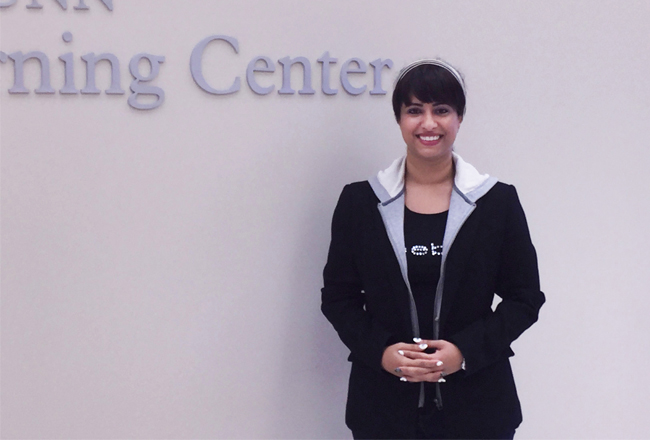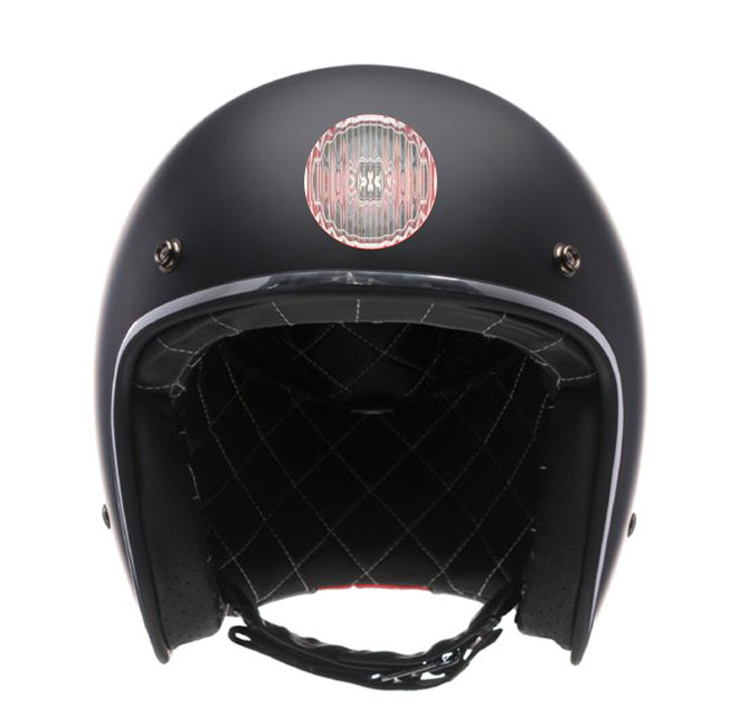U. of Bridgeport grad student making name as an inventor
The past couple of months have been a pretty wild ride for Stratford resident Reem AlAttas.
In September, the inventive University of Bridgeport student”™s next-generation bike helmet won a $10,000 grand prize and the $2,000 Judges”™ Favorite Award at the CTNext Entrepreneur Innovator Competition. As a result, her photo appeared on the front page of a newspaper in her native Saudi Arabia, right below that of King Salman.

And she”™s kicking around ideas for two more inventions, one of which has drawn interest from IBM.
“It”™s really been crazy,” said the 36-year-old AlAttas, who is pursuing a doctoral degree in computer science and engineering. “Fun, but crazy!”
AlAttas”™ journey to the States began after she earned bachelor”™s and master”™s degrees in computer science at King Saud University in her native country”™s capital of Riyadh. Finding work at Microsoft in Saudi Arabia, first as a technical account manager and then as a licensing sales specialist, eventually led her to the U.S.
“I used to go to Seattle for Microsoft conferences,” she said. “Then I decided to come to the U.S. as a student to pursue my Ph.D. in computer science and to follow my entrepreneurial passions.”
She said she was drawn to the University of Bridgeport because of its strong computer science and engineering programs ”” something that her parents, who still live in Saudi Arabia, were equally enthusiastic about.
“Mom was the first educated woman in her family,” AlAttas said. “She worked as a teacher. Dad worked very hard to support himself and his family, including his parents and a brother. He ended up going to school to become an accountant and now he works with the royals in Saudi Arabia.”
Her award-winning invention, the Rumble Helmet, began life as an app for bicyclists to use through Google Glass. Designed mainly for navigational purposes, the app controlled the helmet”™s lights based on the trail or path that they traveled upon, which could then be saved for future use.

As she did research and refined the app, she said, Neal Lewis, an associate professor of technology management at the University of Bridgeport School of Engineering, kept insisting that she “pivot” to maximize her idea”™s potential.
“I kept pivoting and pivoting, until the app became an actual helmet,” said AlAttas with a laugh.
She began developing the helmet in earnest after finishing a New Product Commercialization class in the spring of 2014. Soon after that, she was able to take advantage of the university”™s opening its Student Entrepreneur Center, where a team of professionals provide free advice to student-entrepreneurs who apply for acceptance in the program.
AlAttas was among the first to be accepted by the center. Its faculty helped her file legal documents and finalize her business plan, she said.
Having entered a number of competitions without winning results, AlAttas said she was initially blasé about the September CTNext competition in Hamden, but Elena Cahill, director of the Student Entrepreneur Center, and entrepreneur-in-residence Mike Roer convinced her to give it a try. “They helped me fix my pitch and create the slides for the presentation,” AlAttas said.
“But when they called my name as a winner, I was still like, ”˜Shut the front door!”™”
The Rumble Helmet prototypes are being manufactured in China to help keep costs down, said AlAttas, who expects her invention to go on sale for $185 next year.
In the meantime, she”™s “somewhere in the middle” of developing two other ideas. One is for a robot that can disassemble and reassemble itself for use in disaster areas, rescue missions and even space exploration, she said. AlAttas is working on that project with professor Tarek Sobh, senior vice president for graduate studies and research at the University of Bridgeport and dean of its engineering school.
She also is developing a posture monitor. AlAttas believes it can help users keep their bones and joints in correct alignment, prevent abnormal wearing of joint surfaces and various pains associated with poor posture, and maintain a good appearance.
The device operates on an Arduino board, an open-source electronics platform that can read a number of types of inputs. In this case, a light sensor warns users when they start to slouch and get closer to their computer monitors.
For that project, which has received an offer from IBM to use their technology in developing, AlAttas is working with computer science and engineering professor Khalid Elleithy, who is also the university”™s associate vice president for graduate studies and research.
One obstacle to invention, said AlAttas, is that “I don”™t really have time for them right now. After all, I”™m still earning my Ph.D.”